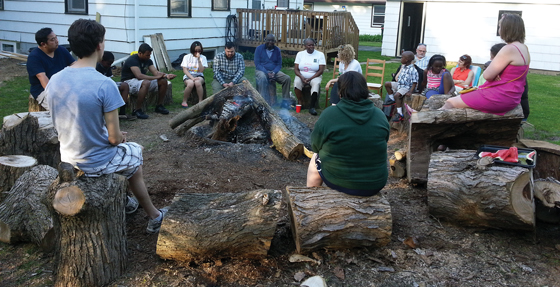Presbyterians Today (August 2014)
Underground Seminary
Small residential program offers pastoral training as alternative to ordination.
By Emily Enders Odom
As if doing church a different way weren’t enough, the Church of All Nations—a vibrant, multicultural church in suburban Minneapolis—is now doing seminary a different way.
The church already had a reputation for innovation, with its practice of testimony sharing in worship, its unique pastoral internship program, and its oversight of eight intentional Christian communities, including one in the church building. But its most recent innovation is Underground Seminary.
Launching next month with a pilot cohort of four to six students drawn from the congregation, the alternative seminary will offer a two-year, full-time residential program culminating in an unaccredited MDiv degree.
The seminary was inspired by Dietrich Bonhoeffer, the early 20th-century German pastor-theologian, who questioned a strictly academic approach to pastoral formation with his Finkenwalde seminary experiment during World War II. Underground Seminary’s plan is for the students to experience a balanced communal life of study, worship, work, service, mentoring, and play. It will be led by three Church of All Nations staff members: Jin S. Kim, senior pastor; John Nelson, parish instructor; and Laura Newby, ministry assistant. Kim and Nelson will serve as primary instructors, and all three will give their time pro bono until the project is fully funded.

“The modern seminary—whether considered liberal or conservative, mainline or evangelical—seems to be about training people for ‘professional’ ministry: preaching, teaching, sacraments, weddings, funerals, visitations, admin,” Kim says. “Emerging generations are not interested in just that. They want help navigating a dehumanizing society and in learning to build healthy and diverse Christian communities, as a means of reshaping that world through prophetic resistance, engagement, and action.”
Kim explains that the new seminary will offer a vision that is counter to what he calls a prevailing imperial assumption—that the rich and powerful have the right to control people, resources, and the earth at will.
“A kingdom mindset understands all of the earth as belonging to God alone,” he says. “It’s a very Reformed understanding that since God is sovereign over all, every person, creature, and ecosystem must be faithfully stewarded. Problem is, we’re trained by seminaries to go out and help people cope with empire rather than to prepare people for an alternative way of life that is a
counter-imperial witness to our faith in Jesus. We can’t liberate people from empire if we can’t see it for what it is and see its devastating effects.”
The seminary’s requirement that students live together in an intentional community is designed to counter an overly academic approach to pastoral formation. “We hope that life together will equip our students to embody generosity, hospitality, and care for each other and the world around them,” he says. “Because embodiment is a key theme, the Fink House [short for Finkenwalde] is where academic and daily life will become an integrated whole to shape Christian character and forge fearless leadership.”
The Underground Seminary initiative is also committed to eliminating student indebtedness. “We guarantee that students will get an MDiv without accruing one penny of debt,” says Kim. “This allows our graduates the option of being poor and working alongside the poor—a trait that may be a gift to struggling communities.”
Because the unaccredited seminary’s future graduates will not be eligible for ordination as teaching elders in the current denominational system, Kim says that congregations and agencies that find the program credible will simply have to hire them on contract.
“Our students would not be that interested in formal credentialing,” he says. “If they were, they would go the conventional route. These are entrepreneurial people who have let go of middle-class aspirations and are choosing to do ministry simply, sustainably, and intelligently among the people, including the poor. We believe this to be a path of costly yet rewarding discipleship.”
Emily Enders Odom is a communications associate for the Presbyterian Mission Agency.